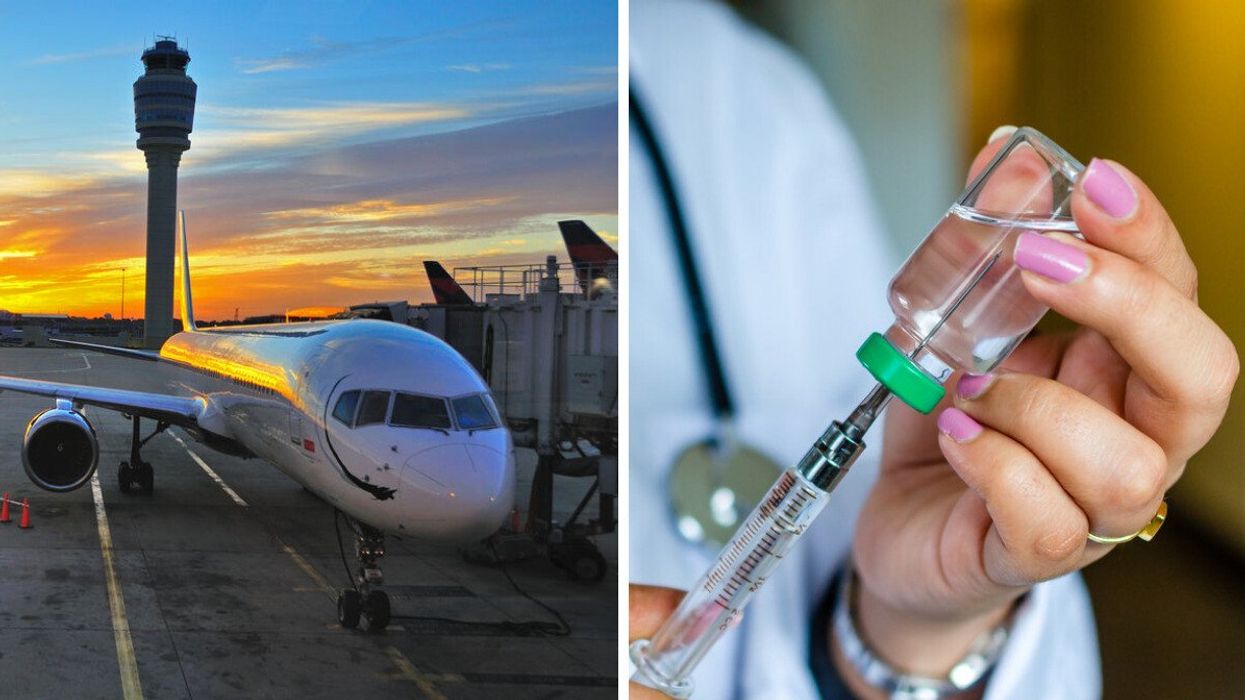Canada's Top Doc Says To Get Two Shots Of This Vaccine Before You Travel Amid A Big Surge
Cases are on the rise!

An airplane during sunrise. Right: A doctor filling a syringe with a vaccine.
As the number of measles cases grows in Canada, the country's top doctor is urging Canadians to be on top of their vaccinations ahead of any travel plans over spring break.
As of February 23, there were six active measles cases in Canada, with some of the patients requiring hospitalization.
On February 28, CTV News reported that a child from Brantford-Brant was diagnosed with measles after a trip to Europe. The outlet reports the child is currently in hospital, but the severity of their condition is unknown.
The child reportedly flew into Toronto Pearson International Airport from London Heathrow Airport on February 23 via a Lufthansa flight.
The latest case confirmation comes following a statement from Dr. Theresa Tam, Canada's Chief Public Health Officer of Canada, regarding a global increase in measles cases.
In the statement released by the Public Health Agency of Canada, the World Health Organization reported a 79% increase in the number of global measles cases in 2023 compared to 2022. That spike has continued into 2024, due "in part to a decline in measles vaccinations during the [COVID-19] pandemic."
With many Canadians planning to travel over spring break, Tam is asking everyone to ensure they are up to date with their measles vaccines.
"As we head into the spring break travel season, I am concerned that the global surge in measles activity, combined with the decline in measles vaccine coverage among school-aged children in Canada, could lead to an increase in imported measles cases, potentially resulting in transmission in communities in Canada," Tam said.
"I strongly advise everyone in Canada to be vaccinated with two doses of a measles vaccine, especially before travelling."
Tam added that the vaccines should "optimally be given at least two weeks before departure, but there are still benefits if given less than two weeks before travelling."
Measles is a highly contagious airborne disease caused by a virus that can lead to serious complications and death, according to the WHO. Initial symptoms include fever, red watery eyes, runny nose and cough followed by a red rash that begins on the face and then moves to the rest of the body.
Children younger than 5 years old, adults over 20 years of age, pregnant people, and those who are immunocompromised are at higher risk of complications from measles.
"If on your journey home to Canada from travel abroad you suspect you may have contracted measles, put on a well-fitting medical mask and limit contact with others, if possible," Tam said in her statement.
"If you are experiencing symptoms, tell a flight attendant or cruise staff before you arrive in Canada or a border services officer as you enter the country."
In January, the WHO reported an "alarming" rise in measles cases in Europe, with 42,200 measles cases reported across 41 member states in the WHO European Region.
Ahead of spring break, Canada has also issued several travel advisories highlighting potential safety concerns in countries like Indonesia, the Bahamas and Iceland.
This article's cover image was used for illustrative purposes only.